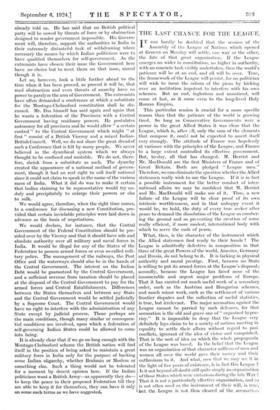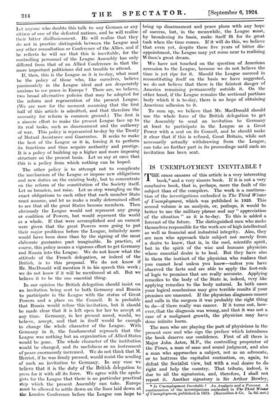THE LAST CHANCE FOR THE LEAGUE.
IT can hardly be doubted that the session of the Assembly of the League of Nations which opened at Geneva on Monday will settle, one way or the other, the fate of that great organization. If the League emerges no wider in constitution, no higher in authority, with no concrete task visibly undertaken, then the world's patience will be at an end, and all will be over. True, the framework of the League will persist, for no politician will wish to incur the odium of the pious by kicking over an institution impotent to interfere with his own schemes. But an end, inglorious and unnoticed, will come at last, as it came even to the long-lived Holy Roman Empire.
This particular session is crucial for a more specific reason than that the patience of the world is growing tired. So long as Conservative Governments were a power in the great Allied States it was clear that the League, which is, after all, only the sum of the elements that compose it, could not be expected to assert itself very strongly. The attitude of France was hopelessly at variance with the principles of the League, and France to a large extent controlled its effective government. But, to-day, all that has changed. M. Herriot and Mr. MacDonald are the first Ministers of France and of Great Britain. Both are pledged " League men." Therefore, we can eliminate the question whether the Allied statesmen really wish to use the League. If it is in fact a possible instrument for the better conduct of inter- national affairs we may be confident that M. Herriot and Mr. MacDonald will make use of it. Thus, a new failure of the League will be clear proof of its own intrinsic worthlessness, and in that unhappy event it would be, we hold, the duty of every true seeker after peace to demand the dissolution of the League as cumber- ing the ground and so preventing the creation of some really efficient, if more modest, international body with which to serve the ends of peace.
What, then, is the character of the instrument which the Allied statesmen find ready to their hands ? The League is admittedly defective in composition in that three of the great Powers of the world, America, Germany and Russia, do not belong to it. It is lacking in physical authority and moral prestige. First, because no State is willing to put its armed forces at the League's disposal ; secondly, because the League has faced none of the innumerable and urgent major problems of Europe. That it has carried out much useful work of a secondary order, such as the Austrian and Hungarian schemes, and much minor work, such as the settlement of various frontier disputes and the collection of useful statistics, is true, but irrelevant. The major accusation against the League cannot be parried by such defences, for that accusation is the old and grave one of " organized hypoc- risy." It is impossible to deny that the League very definitely lays claim to be a society of nations meeting in equality to settle their affairs without regard to past conflicts, ignorant of the idea of victor and vanquished. That is the sort of idea on which the whole propaganda of the League was based. In the belief that the League was an organization of that character millions of men and women all over the world gave their money and their enthusiasm to it. And what, now that we may see it in the light of five years of existence, is in fact this League ? Is it not beyond all doubt still quite simply an organization of those States which were victorious during the late War ? That it is not a particularly effective organization, and so is not often used as the instrument of their will, is true, but the League is not thus cleared of the accusation. Let anyone who doubts this talk to any German or any citizen of one of the defeated nations, and he will realize their bitter disillusionment. He will realize that they do not in practice distinguish between the League and any other consultation or Conference of the Allies, and if he reflects he will see that this is inevitable, for the controlling personnel of the League Assembly has only differed from that of an Allied Conference in that the more important politicians did not trouble to attend.
If, then, this is the League as it is to-day, what must be the policy of those who, like ourselves, believe passionately in the League ideal and are desperately anxious to see peace in Europe ? There are, we believe, two broad alternative policies that may be adopted for the reform and regeneration of the present League. (We are now for the moment assuming that the 'first half of this article is admitted, and that therefore the necessity for reform is common ground.) The first is a sincere effort to make the present League face up to its real tasks, such as disarmament and the outlawry of war. This policy is represented to-day by the Treaty of Mutual Assistance and Guarantee. It seeks to make the best of the League as it is, forcing it to perform its functions and thus acquire authority and prestige. It is a policy of building up a higher and more imposing structure on the present basis. Let us say at once that this is a policy from which nothing can be hoped.
The other policy is to attempt not to complicate the mechanism of the League or impose new obligations and new duties on the existing body, but to concentrate on the reform of the constitution of the Society itself. Let us broaden, not raise. Let us stop wrangling on the exact obligations to each other that each member State must assume, and let us make a really determined effort to see that all the great States become members. Then obviously the League would not represent any group or coalition of Powers, but would represent the world as a whole. If that were accomplished and an earnest were given that the great Powers were going to put their major problems before the League, infinitely more would have been done than by the signing of the most elaborate guarantee pact imaginable. In practice, of course, this policy means a vigorous effort to get Germany and Russia into the League. We do not know what the attitude of the French delegation, or indeed of the British, is to this proposal. We do not know if Mr. MacDonald will mention it in his speech this week ; we do not know if it will be mentioned at all. But we believe it to be the one essential thing.
In our opinion the British delegation should insist on an invitation being sent to both Germany and Russia to participate in the League with the status of Great Powers and a place on the Council. It is probable that Russia would refuse this invitation, but it should be made clear that it is left open for her to accept at any time. Germany, in her present mood, would, we believe, accept, and that in itself would be enough to change the whole character of the League. With Germany in it, the fundamental reproach that the League was nothing but an organization of Allied States would be gone. The whole character of the institution would be changed, and its usefulness as an instrument of peace enormously increased. We do not think that M. Herriot, if he was firmly pressed, would resist the sending of such an invitation to Germany. In any case we believe that it is the duty of the British delegation to press for it with all its force. We agree with the apolo- gists for the League that there is no particular practical step which the present Assembly can take. Europe must be allowed to settle down on the lines laid down at the London Conference before the League can hope to bring up disarmament and peace plans with any hope of success, but, 'in the meanwhile, the League must, by broadening its basis, make itself fit for its great task when the time comes. If it will do this, we believe that even yet, despite these five years of bitter dis- appointment, the League may yet come near to realizing Wilson's great dream.
We have not touched on the question of American accession to the League, because we do not believe the time is yet ripe for it. Should the League succeed in reconstituting itself on the basis we have suggested, we do not believe that there is the faintest danger of America remaining permanently outside it. On the other hand, if the League remains the sectional partisan body which it is to-day, there is no hope of obtaining American adhesion to it.
To sum up, we believe that Mr. MacDonald should use the whole force of the British delegation to get the Assembly to send an invitation to Germany at least to participate in the League as a Great Power with a seat on its Council, and he should make it clear that if this is refused, Great Britain, while not necessarily actually withdrawing from the League, can take no further part in its proceedings until such an invitation has been sent.







































 Previous page
Previous page